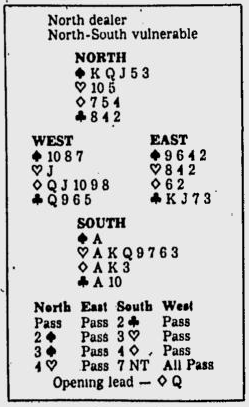The Bulletin – 27 Sep 1981
What makes a play «right?» The practical person has no problem. «A play is right if it works,» he tells you. The bridge expert, isn’t so sure.
Let’s set the scene. You are Mike Lawrence, and your partner is Eddie Kantar, each of you several times a world champion and each the author of several justly admired bridge books. Is the final session of the North American Life Master Pair Championship. You’re having a good game, and you’re very much in contention when you meet the hand shown below.
You, South, bid two clubs, showing a big hand but not promising length in clubs. Kantar’s response promises five or more spades headed by two of the three top spade honors. You then show hearts, your real suit, and Kantar rebids his spades. Now you bid four diamonds, to see what you can find out. Partner takes you back to hearts, and you reason that if he has the jack of hearts you can get to his hand for discards on his spades.
Even if he has three low hearts, you can almost surely draw hearts in two rounds and then lead to his third heart to reach the dummy.
Since a shrinking violet doesn’t win world championships, you bid the grand slam. But then Kantar puts down that garbage — only two hearts and no jack.
What is the right play? No question about the right play at rubber bridge. Making the grand slam is all that matters. You win the first diamond, clear the ace of spades out of the way and put the ace of hearts on the table, closing your eyes for luck.
When you open your eyes, you discover that the jack of hearts has dropped. A lovely sight! So you lead a heart to the ten, discard a diamond and a club on high spades and then show your hand, claiming the rest of the tricks.
But this isn’t rubber bridge. This is a matchpoint pair contest, and your cards will be held by 29 other expert pairs. Probably about 20 of those pairs will bid a grand slam, just as you did. If you can find a way to go down only one while most of the others are going down two, you will have a fine tournament score even though you don’t make, the grand slam.
The odds are 7 to 1 against finding a singleton jack of hearts. But the odds are even that West (rather than East) has the jack of hearts. So you take the first diamond, clear the ace of spades out of the way and then you make the right play: a low heart!
West plays the jack of hearts, and you have a moment of quiet satisfaction. You spread your hand and claim the rest. But since you’re only human (Yes, Virginia, bridge experts are human), you ask West anxiously:
«How many hearts did you have?» Yes, you made the «right» play, but this was the time to play for a miracle. Your opponents, 17-year old Steve Weinstein and Fred Stewart, win the championship; and you finish in third place. If you had played for the miracle you’d have won, and they’d have been third.
If you were a lesser mortal you, would be crushed. But if you are a Mike Lawrence of an Eddie Kanter, you congratulate the winners, recalling that you always pray for difficult hands so that your skill will make a real difference.
